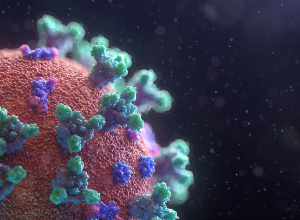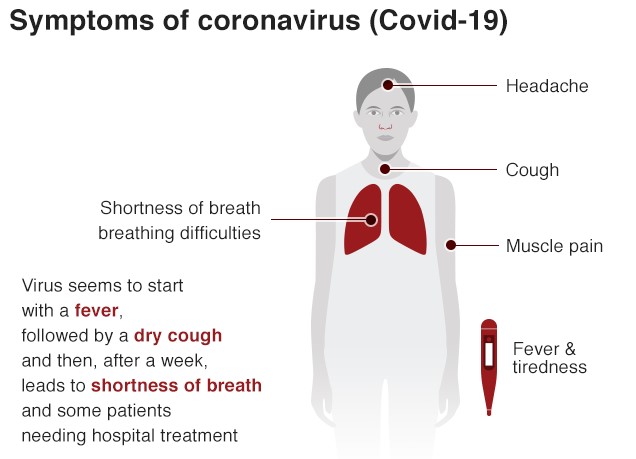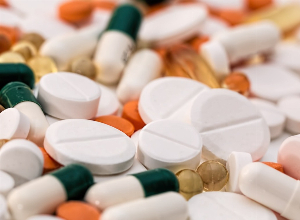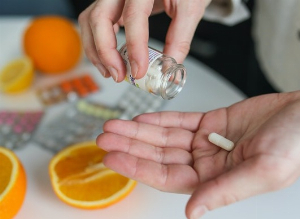Coronavirus: What do you need to know?
Published 17 Mar 2020 • By Camille Dauvergne
After the emergence of the coronavirus SARS, which was responsible for pneumonia in 2003 and MERS, responsible for severe respiratory diseases in 2012, the world is now facing a new coronavirus: SARS-CoV2. Where does this new virus come from? What are the symptoms? How can we protect ourselves? We tell you all about the Coronavirus and COVID-19 infection!

Coronavirus, COVID-19, SARS-Cov2, what does all this mean?
According to the World Health Organization (WHO), "Coronaviruses (CoV) are a large family of viruses that cause illness ranging from the common cold to more severe diseases such as Middle East Respiratory Syndrome (MERS-CoV) and Severe Acute Respiratory Syndrome (SARS-CoV)".
In December 2019, an epidemic of pneumonia with no known cause surfaced in the city of Wuhan (Hubei Province, China). On January 9, 2020, the discovery of a new coronavirus (first called 2019-nCoV and then officially SARS-Cov2) was officially announced by the Chinese health authorities and the World Health Organization (WHO). The acronym SARS-Cov2 stands for "Severe Acute Respiratory Syndrome Coronavirus 2".
This new virus is the cause of a new infectious respiratory disease called COVID-19 (for CoronaVIrus Disease 2019). Viruses and the diseases they cause, often have different names. For example, HIV is the virus that causes AIDS. In the case of the current pandemic, Cov2-SARS is the virus (coronavirus) that causes the COVID-19 infection.
Where did the coronavirus come from?
According to the Pasteur Institute, it is likely that the virus comes from an animal reservoir that has not been identified to date. Even if SARS-Cov2 is very close to a virus detected in a bat, the animal responsible for transmission to humans has not yet been identified with certainty. Several publications suggest that pangolin, a small mammal consumed in southern China, could be involved as an intermediate host between bats and humans.
Human-to-human transmission of the virus has been proven and it is estimated, to date, that in the absence of control and preventative measures, each patient could infect between 2 and 3 people.
How is the Coronavirus spread?
Coronavirus is transmitted through respiratory droplets: sputtering, sneezing, coughing, etc. Any close contact with a sick person, such as sharing the same living space, direct contact within 1 metre or a discussion of at least 15 minutes without protection, can transmit the virus. Harvard Medical School has shared that recent studies have found that the coronavirus "can survive up to 4 hours on copper, up to 24 hours on cardboard, and up to 2 to 3 days on plastic and stainless steel" and its droplets can remain in the air for up to 3 to 4 hours before they fall, though most fall more quickly.
According to WHO, the incubation period for the COVID-19 coronavirus is generally 3 to 5 days, however, it can extend up to 14 days. During this period, the subject may be contagious: he or she may carry the virus before the onset of symptoms or at the onset of weak signals.
What are the symptoms of COVID-19?

The main symptoms are fever (or the feeling of fever), as well as cough and/or shortness of breath. In the most severe cases, the patient may experience acute respiratory distress syndrome, acute kidney failure, or even multi-visceral (multi-organ) failure, which can lead to death.
What are the precautions to follow on March 17, 2020 at 9:00 am?
General Recommendations
These are the government recommendations which are regularly updated here: https://www.gov.uk/government/topical-events/coronavirus-covid-19-uk-government-response
On 16 March 2020, the Prime Minister recommended the following measures be put in place:
- If you or a member of your household are exhibiting any key symptoms (a high temperature or a new, continuous cough), you are advised to remain at home for 14 days
- If possible, it is advised to remain indoors at all times, with the acception of occasional exercise done at a safe distance from others
- Stop non-essential contact with others, particularly if you are over 70 years of age, are pregnant, or have an underlying health condition
- Stop all unneccessary travel
- Work from home where possible
- Avoid public spaces, such as pubs, clubs, theatres and other social venues
In addition, the government recommends the following good practices:
- Wash your hands with soap and water often – do this for at least 20 seconds
- Always wash your hands when you get home or into work
- Use hand sanitiser gel if soap and water are not available
- Cover your mouth and nose with a tissue or your sleeve (not your hands) when you cough or sneeze
- Put used tissues in the bin immediately and wash your hands afterwards
- Avoid close contact with people who have symptoms of coronavirus
- Only travel on public transport if you need to
- Use phone, online services, or apps to contact your GP surgery or other NHS services
In case of signs of respiratory infection (fever or feeling of fever, cough, difficulty breathing):
- Stay at home if you have either a high temperature (you feel hot to touch on your chest or back) or a new, continuous cough (this means you've started coughing repeatedly)
- Do not go to a GP surgery, pharmacy or hospital
- You do not need to contact 111 to tell them you're staying at home and testing for coronavirus is not needed if you're staying at home
- Use the NHS 111 hotline online coronavirus service if you feel you cannot cope with your symptoms at home, your condition gets worse or your syptoms do not get better after 7 days
What is the situation in the UK on 17 March at 9:00 am?
According to the government's information site, updated on 17 March 2020 at 9 a.m., 50,442 people have been tested in the UK, of which 48,492 were confirmed negative and 1,950 were confirmed as positive. The latest confirmed number of deaths will be announced later today.
Currently the UK is in the Delay stage of the government's emergency health response plan.
Useful sites and numbers
If you’re worried about coronavirus, you can get advice at nhs.uk/coronavirus.
Use the NHS 111 online coronavirus service if:
- You feel you cannot cope with your symptoms at home
- Your condition has worsened
- Your symptoms do not get better after 7 days
If you need medical help right now, call 111. You might have to wait longer than usual.
Advice in other parts of the UK:
- Scotland: Coronavirus self-help guide
- Wales: Coronavirus COVID-19 symptom checker
- Northern Ireland: call 111

 Facebook
Facebook Twitter
Twitter







